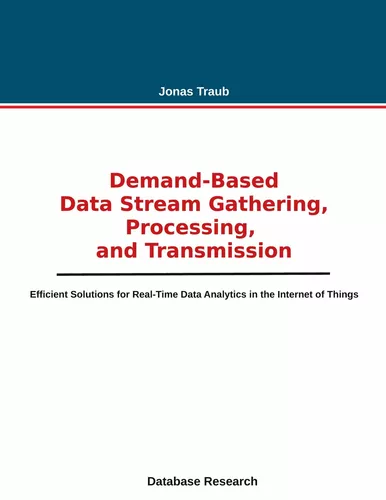Skip to the end of the images gallery Navigation umschalten
Skip to the beginning of the images gallery Navigation umschalten

Demand-based Data Stream Gathering, Processing, and Transmission
Efficient Solutions for Real-Time Data Analytics in the Internet of Things
Paperback
206 Seiten
ISBN-13: 9783752671254
Verlag: Books on Demand
Erscheinungsdatum: 09.04.2021
Sprache: Englisch
Farbe: Ja
erhältlich als:
CHF 28.50
inkl. MwSt. / portofrei
Ihr eigenes Buch!
Werden Sie Autor*in mit BoD und erfüllen Sie sich den Traum vom eigenen Buch und E-Book.
Mehr erfahrenThis book presents an end-to-end architecture for demand-based data stream gathering, processing, and transmission. The Internet of Things (IoT) consists of billions of devices which form a cloud of network connected sensor nodes. These sensor nodes supply a vast number of data streams with massive amounts of sensor data. Real-time sensor data enables diverse applications including traffic-aware navigation, machine monitoring, and home automation.
Current stream processing pipelines are demand-oblivious, which means that they gather, transmit, and process as much data as possible. In contrast, a demand-based processing pipeline uses requirement specifications of data consumers, such as failure tolerances and latency limitations, to save resources.
Our solution unifies the way applications express their data demands, i.e., their requirements with respect to their input streams. This unification allows for multiplexing the data demands of all concurrently running applications. On sensor nodes, we schedule sensor reads based on the data demands of all applications, which saves up to 87% in sensor reads and data transfers in our experiments with real-world sensor data.
Our demand-based control layer optimizes the data acquisition from thousands of sensors. We introduce time coherence as a fundamental data characteristic. Time coherence is the delay between the first and the last sensor read that contribute values to a tuple. A large scale parameter exploration shows that our solution scales to large numbers of sensors and operates reliably under varying latency and coherence constraints.
On stream analysis systems, we tackle the problem of efficient window aggregation. We contribute a general aggregation technique, which adapts to four key workload characteristics: Stream (dis)order, aggregation types, window types, and window measures. Our experiments show that our solution outperforms alternative solutions by an order of magnitude in throughput, which prevents expensive system scale-out.
We further derive data demands from visualization needs of applications and make these data demands available to streaming systems such as Apache Flink. This enables streaming systems to pre-process data with respect to changing visualization needs. Experiments show that our solution reliably prevents overloads when data rates increase.
Current stream processing pipelines are demand-oblivious, which means that they gather, transmit, and process as much data as possible. In contrast, a demand-based processing pipeline uses requirement specifications of data consumers, such as failure tolerances and latency limitations, to save resources.
Our solution unifies the way applications express their data demands, i.e., their requirements with respect to their input streams. This unification allows for multiplexing the data demands of all concurrently running applications. On sensor nodes, we schedule sensor reads based on the data demands of all applications, which saves up to 87% in sensor reads and data transfers in our experiments with real-world sensor data.
Our demand-based control layer optimizes the data acquisition from thousands of sensors. We introduce time coherence as a fundamental data characteristic. Time coherence is the delay between the first and the last sensor read that contribute values to a tuple. A large scale parameter exploration shows that our solution scales to large numbers of sensors and operates reliably under varying latency and coherence constraints.
On stream analysis systems, we tackle the problem of efficient window aggregation. We contribute a general aggregation technique, which adapts to four key workload characteristics: Stream (dis)order, aggregation types, window types, and window measures. Our experiments show that our solution outperforms alternative solutions by an order of magnitude in throughput, which prevents expensive system scale-out.
We further derive data demands from visualization needs of applications and make these data demands available to streaming systems such as Apache Flink. This enables streaming systems to pre-process data with respect to changing visualization needs. Experiments show that our solution reliably prevents overloads when data rates increase.
Eigene Bewertung schreiben









Es sind momentan noch keine Pressestimmen vorhanden.